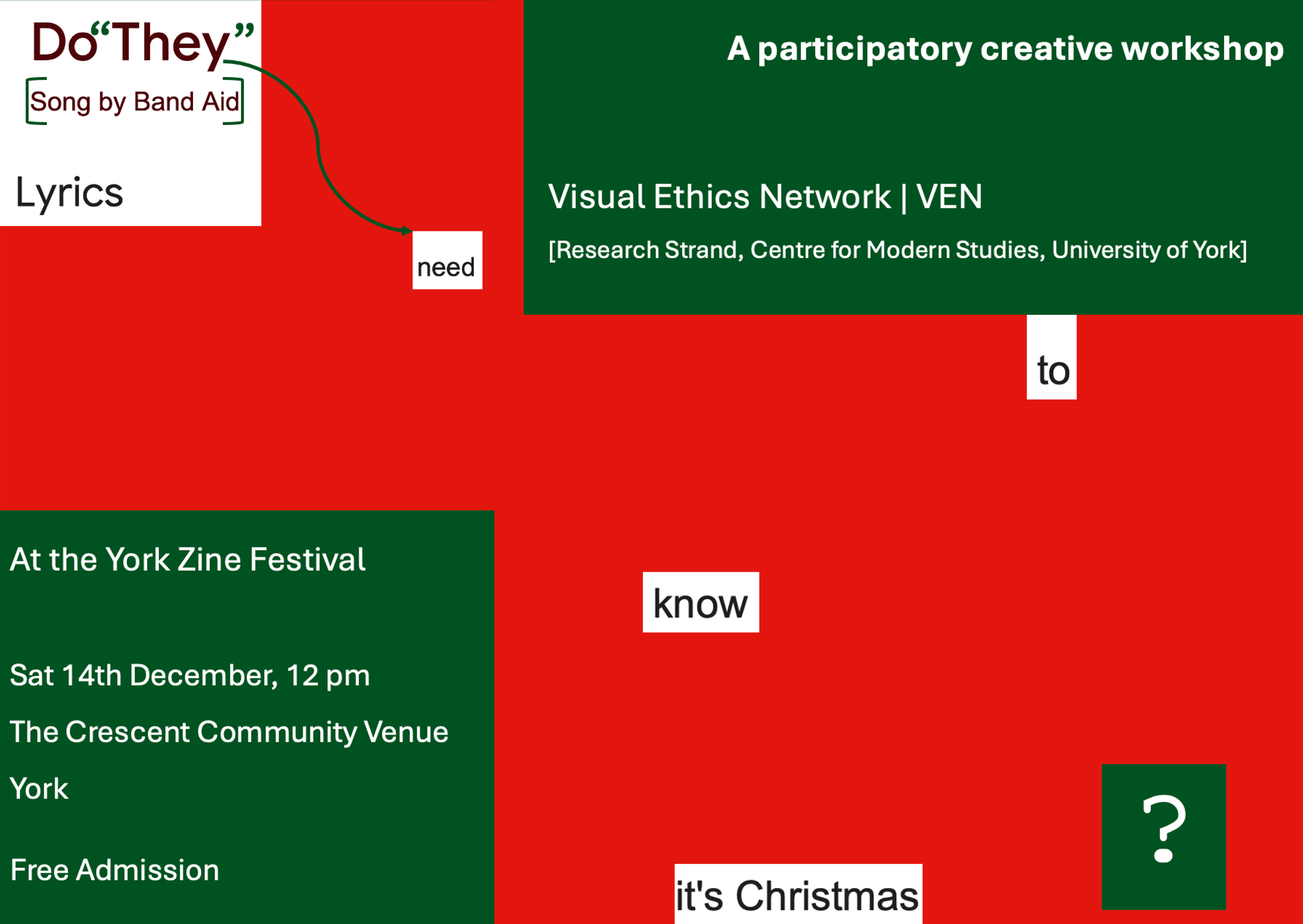
Honouring the artwork of refugee children and war-affected youth: Curatorial Conversations
In this online talk and workshop, Prof. Claudia Mitchell will discuss the ethical challenges as part of curatorial conversations in working with the artwork of refugee children and war-affected youth.

Holding subjectivities in the Art Museum: ‘Pedagogical Art Objects’ and an ethics of care.
For this Visual Ethics Network online session, we will be joined by the artist Dr Kimberley Foster, who will introduce her practice research and discuss the ethical implications of creating ‘Pedagogical Art Objects’ specifically aimed at disrupting conventional ways of knowing within the art museum.
![Photography & Text: thinking the ethics of [con]texts | Three online gatherings](https://images.squarespace-cdn.com/content/v1/64760a2ff164cc136fee5206/1743174152852-5DZQP8HX4QKMHYSIVJM6/POSTER_Event+April+2025.png)
Photography & Text: thinking the ethics of [con]texts | Three online gatherings
In these online gatherings, we will explore three brief (canonical) texts on the nature of photography by Eco, Kracauer and Flusser. A key question that we will be able to identify in all these texts is: What is a photograph? However, the aim of our engagement with these texts will be to think the layer beyond an ontological consideration in order to examine what are the ethics of the relationship between photography and written [con]texts.

Do "They" Need To Know It's Christmas? A Visual Ethics Network Workshop
A creative participatory workshop with a collective reading session and collage-making.
Part of York Zine Festival 2024
Call for Papers: Images through words: the ethics of “reading”
Call for Papers: Images through words: the ethics of “reading”
A panel at the 2025 Association for Art History Annual Conference, 9–11 April 2025, University of York
Deadline for abstracts: 1 November 2024
Armed with Words: Interpreting the War in Afghanistan (2001-2021)
An event with Photographer Andy Barnham and Professor Sara de Jong
This Visual Ethics Network event will explore the ethics of photography and visual activism by looking at a collaborative project entitled We Are Here, Because You Were There: Afghan Interpreters in the UK, created by the photographer Andy Barnham and Professor Sara de Jong from the Politics and International Relations Department of the University of York. This ongoing project explores the trauma of war and how it was experienced by both Afghan interpreters who worked for the British Army in the Afghanistan war and their families (2001-2021) and by veteran advocates. By involving both portrait photography and testimonies, the visual outcome incorporates visually edited images and quotes by the aforementioned interviewed participants. The event will tackle questions of trauma, injury, military intervention, forced migration, political solidarity and how these are approached and made visible through research-based portrait photography and visual design, as a way of addressing and interrogating complex ethical issues.
How to picture a human right? An experimental creative workshop.
Could we envisage a visual language in which human rights could be represented without having to first be violated? Join us this Saturday 16th of December at the Winter York Zine Fest to explore these timely questions through a hands-on/making workshop, and to also mark the 75th anniversary of the Human Rights Day (10 December). This creative workshop will involve zine-making and blackout poetry. Participants will be provided with relevant sources, material, and guidance to develop their own creations on the theme, and will engage in group discussion.
Blackout Poems for “Missing” Others: A Creative Participatory Workshop
How can we commemorate those that remained “missing” or “anonymous”? Those whose next of kin were not there to claim their bodies and grieve them? How can we collectively grieve them? By employing blackout poetry on news reports about the refugee and migrant crisis in the Mediterranean, on this year’s World Refugee Day (20th of June), which is designated by the United Nations to “honour refugees around the globe”, we will collectively rewrite narratives as a first step in acknowledging so many losses of human lives and our ethical responsibility as contemporary citizens.
Reenacting Photography: Artist talk and Workshop
In-person and partially online. Treehouse, Berrick Saul Building, University of York (Campus West)
For this one-day hybrid event, we will be joined by Amy D’Agorne, artist and photographer, and will explore cases of reenacting photographs. We will discuss what the term “reenactment” might potentially offer in the context of photographic ethics and to what extent it can assist a renewed approach to the ethical ramifications associated with images of colonial histories.
Participatory Art Practices and Ethics
For this Visual Ethics Network event, we will be joined by the artist Clare Nattress, York St John University, who will start the session with an introduction about her practice based research in relation to air pollution and participatory performative cycling as an artistic method.
Representing Homelessness
The second session of the Visual Ethics Network will be introduced and led by Dr Thomas Morgan Evans (Art Academy London) as a lead-up to the CAA conference panel he is organising in February, entitled "Reimag(in)ing Homelessness".
Why Visual Ethics
By employing the World Café Method for the inaugural session of VEN we will explore how we can define “visual ethics”, the lenses through which it has been approached in different disciplines, the key themes that could be explored in future sessions and explore whether the key questions differ significantly when posed from different disciplinary stances.